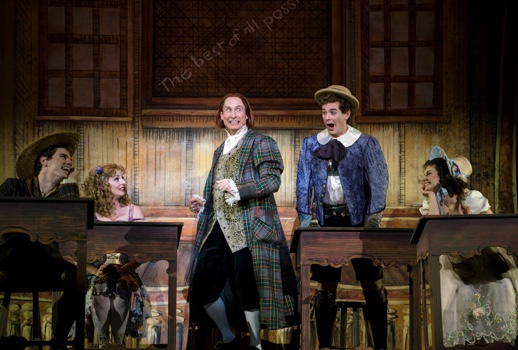
And indeed, when the piece premiered at the Martin Beck Theater (currently named the Al Hirschfeld) in 1956, it was a disaster, despite the vocal talents of Barbara Cook and a majestic score by Bernstein.
In a new production at New York City Opera, directed by the legendary Harold Prince, many of these violent, disquieting experiences unfold in rapid succession, amped up stylistically to the point of absurdity. Much like Voltaire’s novel, the operetta uses a glib, fast-paced style to elide the darker, more obscene aspects of the plot and render palatable the experiences endured by the main characters.
With a book by Hugh Wheeler (replacing the original, lambasted version by Lillian Hellman), the performance moves swiftly through crimes, cruelty, and disaster with disconcerting ease. But while the tongue-in-cheek approach seems appropriate for a Broadway musical, there is still a tangy, sour taste to this satire—especially when juxtaposed against Bernstein’s earnest score.
This juxtaposition of soaring optimism against grim reality is a tension that drives much of the plot. Candide, a student of the philosopher Pangloss (a character Voltaire developed from the philosophy of Gottfried Wilhelm Leibniz), has his unwavering, sunny disposition challenged to the extreme; eventually it is eradicated by the world’s incessant horror.
But before that happens, Candide, under the tutelage of his master, believes in a “Universal Good,” that all the terrible things that happen in this world happen for the best. These experiences include the rape and enslavement of his beloved Cunegonde, a member of his aristocratic family who faces a similar moral trajectory.
At first glance, the plot’s tautological cruelty recalls the perversity of Sade; the figure of Candide especially summons the steadfast morality and punishment of Justine, or even the moral fortitude of Samuel Richardson’s Clarissa. Bernstein’s music only deepens this cruelty, in that it manages to ennoble Candide’s optimism, working against the book’s cynical satire.
The effect produces ambivalence, provoking both admiration and sophisticated distaste for the main character’s moral philosophy. This raises troubling ethical questions, especially in our own time. For modern audiences, the operetta hardly functions as a critique of Voltaire’ contemporary Leibnizian philosophy; even so, it manages to speak quite fervently to our own modern problems.
But for New York City Opera, its current production at Lincoln Center’s Rose Theater conjures the ghosts of the company’s former glory days. Having mounted the operetta at NYCO for the first time in 1982, Prince returns yet again with an agile, politically incorrect iteration. And though the decision to have Prince direct the piece feels like backward thinking (a trend, I’ve noticed, of General Director Michael Capasso), the production is competent and certainly worth seeing.
Just as Prince’s 1973 “Chelsea Version” at BAM’s Chelsea Theater Center unfolded succinctly, this current Candide moves with an easy gusto. Prince makes use of several levels, pushing the performers beyond the proscenium and into the house. The result is a zany, kinetic energy that drives the plot forward, never forcing the audience to linger too intently on the various crimes against humanity.
However, it’s difficult to morally work through Prince’s approach. In so many ways, my millennial brain short-circuits as I try to understand certain choices the director makes. For example, as we learn of Cunegonde’s enslavement to a Jewish merchant (the admirably game Chip Zien) and a Catholic Inquisitor (Brooks Ashmanskas, equally full-throttled), Prince deploys vulgar anti-Semitic humor to make light of the very real horror of female objectification.
And as the characters move throughout the world, they encounter many different cultures from both South America and the Middle East. Prince’s theatrical approach to these ethnicities feels cheap, in that it reduces robust cultures to caricature, and with little comic effect. While much of this might lie with Voltaire’s satire, it’s still difficult to stomach when presented alongside the violence and oppression that make up much of the operetta’s plot.
Regarding the performances, only Meghan Picerno as Cunegonde and Jessica Tyler Wright as Paquette succeed both theatrically and vocally. Picerno’s Cunegonde is a savy ingénue whose flexible soprano bolsters a winning, charismatic sense of humor. And Wright displays equally hilarious cheekiness as the sexually adventurous Paquette.
Jay Armstrong Johnson, as Candide, is significantly less successful. He’s certainly handsome, but his embodiment of the sweet and simple optimist feels forced and hollow, an overly externalized depiction that fails to explore Candide’s earnest embrace of his master’s philosophy. But even more egregiously, his voice fails the luminous score, especially during the soaring finale of “Make Our Garden Grow.”
The characters Voltaire, Pangloss, Sage, et al, as depicted by Broadway veteran Greg Edelman, are equally superficial and poorly sung. Many of the actor’s jokes and gags fall flat, feeling stale and worn, and his voice cannot match the score’s grandeur. While this is generally innocuous, there are certain passages where his vocal shortcomings become completely unworkable.
Linda Lavin as the Old Woman exudes a worldly warmth. But she too fails to do her job as a singer. To be fair, she is a theater veteran and television star; her very presence in a City Opera production lends the affair a certain theatrical cachet. However, her “Easily Assimilated” still borders on the inept, making the moment difficult to watch.
And Keith Phares is bland and unobtrusive in the role of Maximilian. His operatic baritone is beautiful enough for the music, but like his colleagues, he is unable to pull all the pieces together into a cohesive whole: his Maximilian is devoid of charisma, warmth, and humor, and he lacks a precise and necessary comic timing
The score, conducted efficiently by Charles Prince, still moves with its vulnerability and generosity. This alone is probably reason enough to revive Candide. But, unfortunately, I find the piece, in all its absurd violence, more topical than ever. I cannot help but think of recent events in Aleppo, the many mass shootings, the crisis of climate change, and the recent elections (as Voltaire famously advises: “Those who can make you believe absurdities can make you commit atrocities”).
The ability to remain ever optimistic, to see these events as “the best of all possible worlds,” eludes me, just as it eventually eludes Candide. And so, as one leaves the theater, the question uncomfortably surfaces: in our own age of ridiculous and needless violence, how can we make our own gardens grow?
Photo: Sarah Shatz



